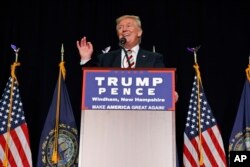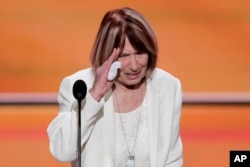Republican Senator Susan Collins says she will not vote for the party's presidential nominee, Donald Trump, saying he does not represent Republican values or the "inclusive approach to governing" the country needs.
Collins, who was elected to the Senate in 1996, wrote in an opinion piece in The Washington Post that her view of Trump as unfit for the presidency is based on his disregard for the principle of treating other people with respect.
"Instead, he opts to mock the vulnerable and inflame prejudices by attacking ethnic and religious minorities," Collins said.
She also expressed worry that if elected Trump's "lack of self-restraint and his barrage of ill-informed comments" would make the world more dangerous.
"It is reckless for a presidential candidate to publicly raise doubts about honoring treaty commitments with our allies. Mr. Trump's tendency to lash out when challenged further escalates the possibility of disputes spinning dangerously out of control."
There was no comment from the Trump campaign Monday night about the senator's statement. But the campaign did respond to a letter from 50 former national security and foreign policy officials who served under previous Republican presidents and said they, too, would not vote for Trump.
The group that includes former Homeland Security Secretaries Michael Chertoff and Tom Ridge, former CIA chief Michael Hayden, and former Director National Intelligence and Deputy Secretary of State John Negroponte say they know what it takes to be president and Trump lacks the character and experience for the job.
"Mr. Trump has demonstrated repeatedly that he has little understanding of America's vital national interests, its complex diplomatic challenges, its indispensable alliances, and the democratic values on which U.S. foreign policy must be based," the letter says. "At the same time, he persistently compliments our adversaries and threatens our allies and friends.
The former officials wrote that Trump shows "an alarming ignorance of basic facts" about today's international politics and no desire to educate himself.
Trump's campaign said those who signed the letter deserve "the blame for making the world such a dangerous place."
"They are nothing more than the failed Washington elite looking to hold onto their power, and it's time they are held accountable for their actions," the campaign said. It attributed the decision to invade Iraq in 2003 and the rise of Islamic State to the group, as well as his Democratic opponent Hillary Clinton.
Clinton's campaign also issued a statement Monday after the families of two Americans killed in the 2012 attack on the U.S. consulate in Benghazi, Libya, filed a lawsuit against her.
Patricia Smith, the mother of Sean Smith, and Charles Woods, father of Tyrone Woods, filed the wrongful death suit saying it is highly probable Clinton's use of a private email system while secretary of state left sensitive information open to militants.
"As a direct result of Defendant Clinton's reckless handling of this classified, sensitive information, Islamic terrorists were able to obtain the whereabouts of Ambassador Christopher Stevens and thus the U.S. State Department and covert and other government operations in Benghazi, Libya and subsequently orchestrate, plan, and execute the now infamous September 11, 2012 attack," the suit alleges.
The attack killed Stevens, Smith, Woods and Glen Doherty.
A two-year, Republican-led investigation in the U.S. House of Representatives ended in June with no new allegations that Clinton did anything wrong related to the attack.
Clinton campaign spokesman Nick Merrill said in a statement in response to the lawsuit that, "While no one can imagine the pain of the families of the brave Americans we lost at Benghazi, there have been nine different investigations into this attack and none found any evidence whatsoever of any wrongdoing on the part of Hillary Clinton."
The two candidates are focusing this week on their plans for the economy.
Trump gave a speech Monday in Detroit saying he wants to "jump-start America."
He proposed big tax cuts for businesses and individuals, as well as halting regulations that he says stifle companies. He pledged to rewrite the North American Free Trade Agreement that has been in place since the 1990s and to pull out of the 12-nation Trans-Pacific Partnership that has been presented to Congress but not approved.
Trump also portrayed Clinton as wanting to continue policies he says have not worked under President Barack Obama.
Clinton responded by saying Trump's tax plans will only help the wealthy and will help push the country into recession. She is scheduled to give her own economic address in Detroit on Thursday.







